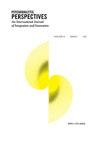Learning to Influence in Psychoanalysis: Discussion and Review of Psychoanalytic Supervision by Nancy McWilliams
Q4 Psychology
引用次数: 0
Abstract
When I was first asked to write a review essay based on Nancy McWilliams’ book on psychoanalytic supervision (2021) I was momentarily surprised. Apart from her published work on psychodiagnosis and treatment (1994, 1999, 2004, 2011, and 2017 (with Lingiardi)), Nancy McWilliams is so well known as a master teacher and supervisor that I had imagined that such a book had long ago been published. Now it has been. And it is very much what those who know the work of Nancy McWilliams have come to expect. It is plainspoken, clearly discussed, comprehensive, and written in a tone that is warm, friendly, and absolutely respectful of the intelligence of the reader. McWilliams wants to convey her understanding, what she has learned, her point of view. There is no playing with obscurity or arcane language, as can too often be found in psychoanalytic writing. Indeed, I think it is the very respect for readers’ intelligence that enables McWilliams to say things very personally. This is her book, her voice, and she expects that readers will be able to think for themselves. It is written from McWilliams’ vast, direct experience as a teacher and supervisor. She says from the outset that she is a believer in the usefulness of received wisdom, and she shares it. While comprehensive in scope—just about every aspect of supervision is brought up and addressed in some way here—McWilliams makes no pretense that this is a neutral, “textbook” survey of issues and points of view. In this book you get在心理分析中学会影响——南希·麦克威廉姆斯《心理分析监督》述评
当我第一次被要求根据南希·麦克威廉姆斯关于精神分析监督的书(2021)写一篇评论文章时,我一时感到惊讶。除了她出版的关于心理诊断和治疗的著作(1994年、1999年、2004年、2011年和2017年(与林吉亚迪合作)),南希·麦克威廉姆斯作为一名大师级教师和导师是如此知名,以至于我想象这样一本书早就出版了。现在已经是了。这正是那些了解南希·麦克威廉姆斯作品的人所期待的。它说话平实,讨论清晰,内容全面,语气温暖,友好,绝对尊重读者的智慧。麦克威廉姆斯想表达她的理解,她学到了什么,她的观点。没有像精神分析写作中经常出现的那样,玩弄晦涩难懂的语言。事实上,我认为正是对读者智慧的尊重使麦克威廉姆斯能够非常个人化地说话。这是她的书,她的声音,她希望读者能够独立思考。这本书是根据麦克威廉姆斯作为老师和导师的丰富而直接的经验写成的。她从一开始就说,她相信公认的智慧是有用的,她也认同这一点。虽然范围很全面——几乎监督的每一个方面都在这里以某种方式提出和解决——但麦克威廉姆斯并不假装这是一次中立的、“教科书式”的问题和观点调查。在这本书中
本文章由计算机程序翻译,如有差异,请以英文原文为准。
求助全文
约1分钟内获得全文
求助全文

 求助内容:
求助内容: 应助结果提醒方式:
应助结果提醒方式:


